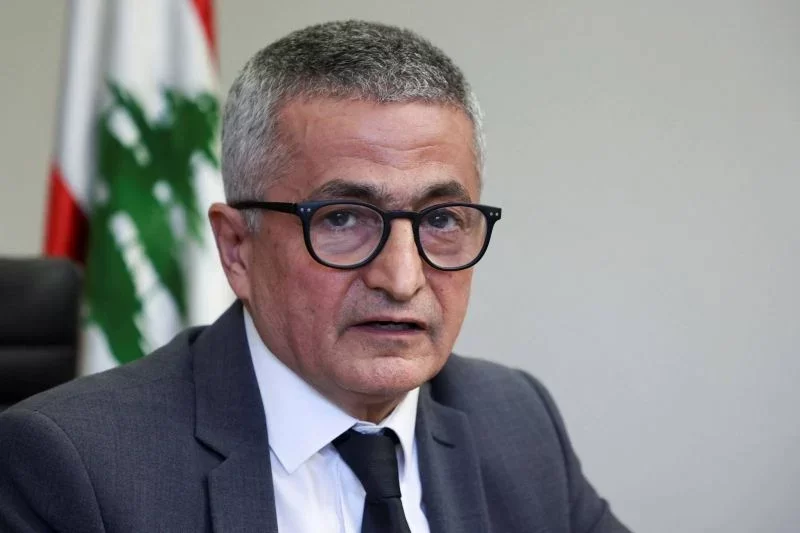
Caretaker Finance Minister Youssef Khalil during his press conference yesterday. (Credit: Mohammad Azakir/Reuters)
Want to get the Morning Brief by email? Click here to sign up.
“There may be a plan to extend the terms of all first-level public servants, not just [Banque du Liban chief Riad] Salameh, but there is not yet consensus on that,” caretaker Finance Minister Youssef Khalil said Friday, a week after the central bank governor announced he does not intend to extend his 30 years in office. Given Lebanon’s current circumstances, replacing Salameh would be “very difficult,” Khalil told Reuters as the BDL head’s latest six-year term is set to expire in July and is mired in controversy. Salameh faces at least five European investigations on suspicions of corruption, set to continue this month with a second visit from foreign judges intending to question the central bank head. The BDL governor is also the subject to a domestic investigation, to which a new lead was appointed last week to follow up on claims of embezzled commissions from the sale of BDL assets through a company owned by Salameh’s brother, Raja.
Protesters in Tripoli warned of an escalation in protests today after they blocked roads on Friday to decry deteriorating living conditions and demand the receipt of their salaries at the Sayrafa lira-to-dollar exchange rate. The Friday protests in Tripoli come a day after protesters set at least five bank facades on fire in the Badaro neighborhood of Beirut and in the north of the country, concluding a week of high volatility in the parallel market exchange rate and record lira lows. Commercial banks have been on strike since Feb. 7 to demand the passing of a capital control law and to protest a judicial decision allowing the resumption of a legal case against Fransabank. Informal restrictions on depositors’ foreign currency funds have been in place since 2019, spurring a series of hold-ups by – occasionally armed – bank customers attempting to make forcible withdrawals. “Solving the depositors' crisis is not done by riots,” caretaker Prime Minister Najib Mikati said Friday after the incidents. “The funds needed to pay off your deposits are not with the banks, so entering them by force, destroying them, or breaking their contents will not benefit you,” the Association of Banks in Lebanon (ABL) said Friday. The World Bank, in a report published last November, claimed Lebanese banks’ losses were “too big to bail.”
Caretaker Health Minister Firass Abiad yesterday announced an upcoming increase in the cost of cancer treatment. Abiad called on the government to provide greater support for the ministry’s budget, adding that medication for patients with cancer is expected to arrive within “a month and a half.” While the government continues to subsidize medicines used to treat chronic diseases and cancer, human rights watchdog Amnesty International earlier this month reported “severe shortages” forcing patients to import and ration drugs. The Health Ministry last month announced plans to issue regular price lists for unsubsidized medicines after a brief strike by pharmacies decrying drug shortages exacerbated by the lira-to-dollar parallel market exchange rate. Abiad also claimed that the state will pay its dues to private hospitals in the coming weeks, after payment delays previously threatened to impose steep costs on patients. Private hospitals last month received an increased withdrawal limit from the central bank, allowing them to revert a decision to bill patients for medication in dollars.
The Ministry of Foreign Affairs condemned an Israeli strike on Syria that killed 15 people Sunday. “Israel does not care about the human suffering associated with its attacks against the inhabitants of the region, especially in times of crisis,” the ministry’s statement read, after the deadliest Israeli strike on the Syrian capital since the start of the civil war in 2011, according to the Syrian Observatory for Human Rights. The same day, a Lebanese parliamentary delegation met with Syrian Foreign Minister Faisal Mokdad during a visit to Damascus led by the head of Parliament's Lebanese-Syrian Brotherhood and Friendship Committee, Amal MP Ali Hassan Khalil. Lebanon has launched a series of initiatives to aid Syria and Turkey after the Feb. 6 earthquake that killed over 46,000 people.
Around a dozen supporters of radical Salafi cleric Ahmad Al-Assir demanded his release during a Friday protest outside the Beirut Palace of Justice. Assir is serving a de facto life sentence for his role in the June 2013 armed clashes in the Abra suburb of Saida that pitted his supporters against Lebanese Army troops — killing 18 soldiers. Protesters associated with the cleric have repeatedly called for his release and 18 related detainees over the past years.
In case you missed it, here’s our must-read article from over the weekend: “Salam, painter: 'The world has let us down”
Compiled by Abbas Mahfouz